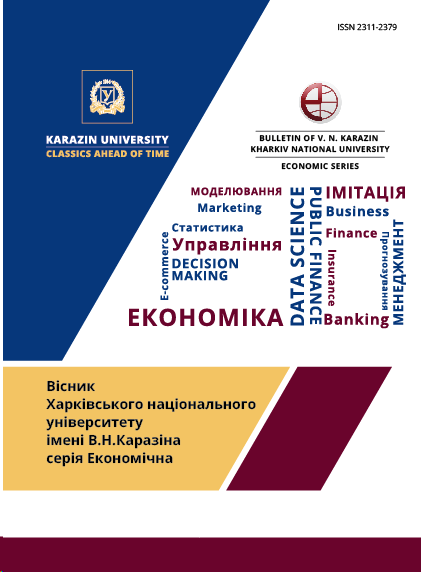The effect of labour migration and structural changes on economic development
Abstract
The article aims to analyze effects of the labour migration and structural changes on economic development. The Russian invasion in Ukraine increased geopolitical risks for the global economy in 2022 and in the present time. The most immediate economic impact of the Ukrainian conflict was sharply rising food, energy, and commodity prices in the world. In the process of massive population displacement people were forced to leave their homes and lose their livelihood. The analysis of basic approaches to the effects of labour migration, and structural changes on global development highlights the contemporary challenges for the current institutional and structural setting of the economies and societies. The current global crisis is likely to have deep-reaching effects that we cannot foresee. It has been mistaken to believe that migrants will serve as a safety valve for developed economies, by providing labour in times of expansion and going away in the recession (Castles & Vezzoli, 2009). The assessment of structural change on the inclusiveness and sustainability of socioeconomic development depends on the specific country. Both the relative supply of skills and skill-based technological change tends to increase income inequality, though not in all countries (Nomaler et al., 2021). The study of the impacts of international emigration on the evolution of the institutions in the origin countries demonstrates the influence of emigration per se (i.e., people who left the country can voice from abroad), and the transfer of the norms of the host country to the home country. The existence of both impacts was confirmed using different indicators of institutional quality. The effects appear stronger when skilled emigration is considered (Beine & Sekkat, 2013). It is proposed that new job structures based on hiring the low-cost labour will appear under the effects of increasing labour migration. One of the decisions could be adoption by policymakers of new systems of global migration governance based on international collaboration and the rule of law by taking lessons from the crisis experience. It will be directed to define sectors that can speed up the process of rebuilding the global economy. Diversifying the economy, increasing product/service sophistication, using comparative advantages and transfer of resources (both labour and capital) leads to more productive activities and a rise in well-being.
Downloads
References
Castles, S., Vezzol, S. (2009). The Global Economic Crisis and Migration: Temporary Interruption or Structural Change? Paradigms, 2. Retrieved from https://www.migrationinstitute.org/files/news/castles-and-vezzoli_the-global-economic-crisis-and-migration.pdf
Nyaoro, D. (2023). Comparison of African Migration to Europe and European Migration in the Last Two Centuries. In book: Human Migration in the Last Three Centuries. Eds. Ingrid Muensterman. doi: http://dx.doi.org/10.5772/intechopen.109348
Darvas, Z. (2023). Two Crises, Two Continents: How the Labour -Market Impacts Have Differed. 9 March. Retrieved from https://www.bruegel.org/analysis/two-crises-two-continents-how-labour-market-impacts-have-differed
World Development Report (2023). Migrants, Refugees, and Societies. 2023. Retrieved from https://www.worldbank.org/en/publication/wdr2023
De Haas, H. (2010). Migration Transitions: A Theoretical and Empirical Inquiry into the Developmental Drivers of International Migration. International Migration Institute, 24. Retrieved from https://www.migrationinstitute.org/publications/wp-24-10
Sulaiman, S. (2020). Theoretical Background and Main Assumptions of Migration. Economics & Working Capital. Retrieved from http://eworkcapital.com/theoretical-background-and-main-assumptions-of-migration/
Belaid, F., Slany, R. (2018). Migration for Structural Transformation. Background Paper No.2. Exploring the Relationship Between Migration and Structural Transformation: An Empirical Analysis. UNCTAD. Economic Development in Africa Report 2018.
Alwrekia, A.Z, Mihi-Ramirez, A, Melchor-Ferrer, E. (2023). Working Poverty and Quality of Employment: The Great Refugee Crisis in Middle Eastern Host Countries. Engineering Economics, 34 (4), 351-365. doi: https://doi.org/10.5755/j01.ee.34.3.333160
Kumpikaite, V., Zickute, I. (2012). Synergy of Migration Theories: Theoretical Insights. Engineering Economics, 23(4), 387-394. doi: https://doi.org/10.5755/j01.ee.23.4.1240
De Sherbinin, A, Grace, K, McDermid, S, Van der Geest, K, Puma, M.J., Bell, A. (2022). Migration Theory in Climate Mobility Research. Climate Mobility. doi: https://doi.org/10.3389/fclim.2022.882343
Charmaz, K. (2014). Constructing Grounded Theory. London UK: Sage Publications.
Egan, M.S. (2021). Structural Injustice and Labour Migration – From Individual Responsibility to Collective Action. Theoria, 87, 1153-1174. doi: https://doi.org/10.1111/theo.12335
Mulska, O.P. (2022). Migration Processes and Economic Growth: Theory of Causality and Practice of Effective Management. Monograph. State Institution “Institute of Regional Studies named after M.I. Dolishny National Academy of Sciences of Ukraine, Lviv.
Chung, T.-P. (2018). Promoting Structural Transformation Through Industrialization. United Nations Industrial Development Organization. ECACC-AA, Conference. 18-20 April.
Hao, T, Sun, R, Tombe, T, Zhu, X. (2020). The Effect of Migration Policy on Growth, Structural Change, and Regional Inequality in China. Journal of Monetary Economics, 113, 112-134. doi: https://doi.org/10.1016/j.jmoneco.2020.03.003
Hernandez, M.A, Ecker, O, Laederach, P, Maystadt, J.F. (2023). Forced Migration. Fragility, Resilience, and Policy Responses. In book: Global Food Policy Report 2023: Rethinking Food Crisis Responses. Publisher: International Food Policy Research Institute (IFPRI). doi: https://doi.org/10.2499/9780896294417
Bürgenmeier, B. (1992). The Links Between Economic Theory and Practice. In: Socioeconomics: An Interdisciplinary Approach. Springer, Dordrecht. doi: https://doi.org/10.1007/978-94-011-2966-4_2
ILO Monitor on the World of Work. (2022). Tenth edition. Multiple Crises Threaten the Global Labour Market Recovery. 31 October.
The World Bank Data. (2022). United Nations Population Division. World Population Prospects. Retrieved from https://data.worldbank.org/indicator/SM.POP.NETM?end=2021&locations=UA&start=1960&view=chart.
The International Organization for Migration. (2023). Retrieved from https://ukraine.iom.int/data-and-resources
ILO Brief. (2022). The Impact of the Ukraine Crisis on the World of Work. Retrieved from https://www.ilo.org/europe/publications/WCMS_844294/lang--en/index.htm
ICMPD Migration Outlook 2023 (2023). Eastern Europe and Central Asia. International Centre for Migration Policy Development. Retrieved from https://www.icmpd.org/file/download/59305/file/230318_ICMPD_Migration_Outlook_EasternEuropeCentralAsia_2023_RU.pdf
Refugees and Migrants (2023). United Nations Refugee Agency. Retrieved from https://news.un.org/ru/story/2022/09/1432261
Social Trends 2023: How the War Turned Ukrainians into a more Conscious Nation. (2023). Gradus Research Company. Retrieved from https://gradus.app/en/open-reports/gradus-report-social-trends-2023-ua/
Shevchenko, P, Nekrashuk, A. (2023). What Happens to Salaries During the War – Who Earns More in Ukraine and Seven EU Countries. New Voice. 23 April. Retrieved from https://biz.nv.ua/markets/zarplata-v-ukraine-komu-povysili-za-god-voyny-i-gde-vyrastet-v-2023-godu-novosti-ukrainy-50317385.html
Global Skills Report (2023). Coursera. Retrieved from https://www.coursera.org/skills-reports/global
UNHCR (2022). Ukraine Refugee Situation. Retrieved from https://data.unhcr.org/en/situations/ukraine
Structural Change for Inclusive and Sustainable and Industrial Development (2017). United Nations Industrial Development Organization. Retrieved from https://www.unido.org/sites/default/files/files/2018-06/EBOOK_Structural_Change.pdf
Trading Economics. (2023). Retrieved from https://tradingeconomics.com/ukraine/remittances
Copyright (c) 2024 Nosova O.

This work is licensed under a Creative Commons Attribution 4.0 International License.

